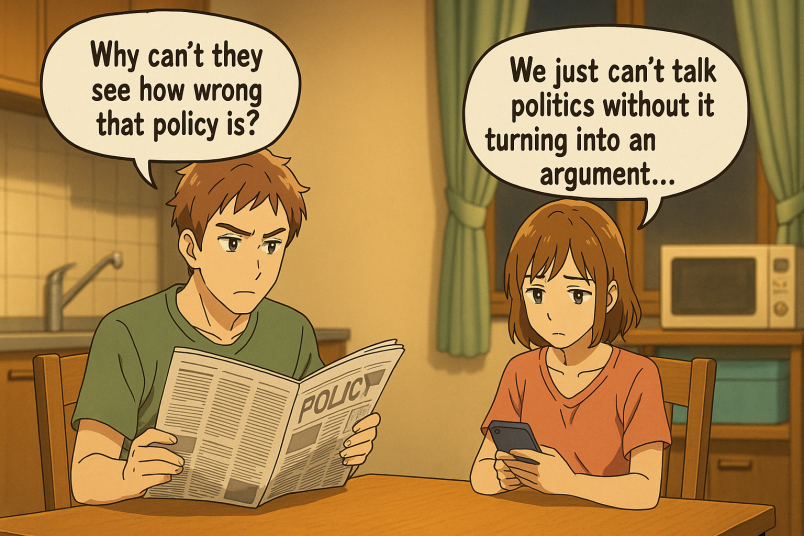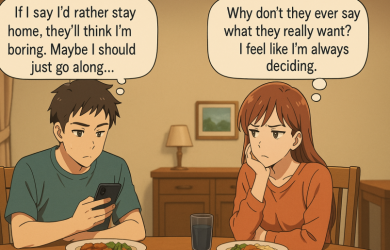10 Tips to Cope With Political Differences in Relationships

Unlock Daily 30-Sec Tips for a Happier Relationship
👉 Subscribe FREEKey Takeaways
Marriage.com AI Quick Summary
It’s not easy when the person you love sees the world differently than you do. Maybe you grew up with similar values, but somewhere along the way, your beliefs took separate paths.
Or perhaps you’ve always known you stand on opposite sides, yet love still found a way to connect you. Politics can stir strong emotions—it’s about identity, fairness, and what feels right. But when those views collide at home, it can leave you feeling misunderstood, frustrated, or even hurt.
The truth is, political differences in relationships aren’t uncommon; what matters is how you navigate them. With a little compassion, curiosity, and patience, it’s possible to protect your connection while respecting what makes each of you unique.
What does it mean to have political differences in a relationship?
Having political differences doesn’t always mean constant arguments or opposing every belief. Sometimes, it’s simply realizing that the person you love sees certain issues through another lens. It could be about policies, social causes, or the leaders they support—each shaped by their experiences and values.
A U.S. study of 510 adults found that voting Republican—personally or through a partner—was linked to higher relationship commitment and adjustment than voting Democrat, especially among unmarried couples. While perceived voting similarity rarely predicted relationship quality, Republican–Democrat pairings showed notably lower adjustment, suggesting political alignment can subtly influence intimacy.
When you have different political views in a relationship, it can feel confusing at times… especially when emotions run deep. But it’s also a chance to understand where those beliefs come from, and how to stay connected even when you don’t fully agree.
-
Why political differences can strain relationships
Politics often touches on what we value most—fairness, safety, and belonging. So when your partner disagrees, it can feel like they’re challenging more than just opinions.
It stirs emotion, pride, and sometimes fear of being misunderstood. Over time, those feelings can quietly build walls between you… unless both of you choose empathy over winning.
10 tips to cope with political differences in relationships
Dating someone with different political views doesn’t necessarily mean the relationship is destined for failure. You may not agree on everything, but you can learn to set your differences aside.
The following tips can help you understand how to deal with political differences in a relationship, while keeping love and respect at the heart of your connection.
1. Avoid hot-button issues
Political differences in relationships can lead to unhappiness when there is intense conflict surrounding these differences. You may have to avoid certain hot-button issues to keep your relationship happy.
For instance, it’s probably best to avoid the topic if you strongly support a new policy but your partner does not. It’s unlikely that you will change your opinion on a topic you’re passionate about, and discussion will only lead to hurt feelings.
Here is an approach that you can consider:
- Identify the topics that tend to trigger heated arguments and agree to leave them off-limits.
- Redirect conversations toward shared interests when things start getting tense.
- Gently remind each other that preserving peace matters more than winning a debate.
2. Try to find common ground
It may seem impossible when you’re at opposite ends of the political spectrum, but couples with different political views may have some beliefs in common. Discuss your overall values and ideology when you both feel up to it.
Research found that couples with political similarity report higher relationship satisfaction and greater political participation than those with differing views. Discussion quality—how openly and respectfully partners communicate—plays a key role. Frequent, expressive dialogue improves satisfaction and engagement, while intense political conflict reduces relationship quality but not participation levels.
You may find areas of agreement or some issues in which one of you has a more middle-of-the-road approach. Areas of common ground can remind you that you’re perhaps not as different as you thought.
Here is an approach that you can consider:
- Make a list of shared values—like honesty, compassion, or fairness—and focus on those.
- Spend time discussing causes or initiatives you both care about.
- Use moments of agreement as a reminder that unity exists beyond politics.
3. Remember the core values that brought you together
Even amid political differences, you and your significant other can share other core values. For instance, you’re both set on having two children or have similar viewpoints toward work and finances.
Whatever the circumstances are, when you’re in the midst of conflict over political differences, remember that this is just one area of disagreement. Place the disagreement into the larger context of your overall relationship, and you likely have numerous commonalities that attracted you to each other in the first place.
Here is an approach that you can consider:
- Reflect together on what first drew you to one another.
- Create a gratitude list of what you love and appreciate about your partner.
- Use reminders of your shared dreams to shift focus away from division.
4. Disagree with respect
Conflict and disagreement are simply a part of life and relationships, but you can still treat your partner respectfully, despite political differences. When you’re having a conversation, and your partner makes a point that you do not necessarily agree with, resist the urge to attack them.
Take time to truly listen to what they’re saying. If you feel yourself becoming heated, pause before responding to avoid your relationship ending over politics.
Rather than calling names, telling them they’re wrong, or becoming defensive, it’s okay to say something like, “I hear you, but I’m in a different place with this issue. Here is where I am coming from…”
Here is an approach that you can consider:
- Practice active listening—repeat what you heard before sharing your view.
- Use calm, non-blaming language even when you disagree.
- Take breaks when conversations get too emotional to stay respectful.
5. Approach your partner with curiosity
When we are involved in a political debate or disagreement, we approach the other person from a defensive stance. Rather than listening to their viewpoint, we attempt to defend our own.
Rather than being on the defensive, show curiosity for your partner. Ask questions about their stance and intentionally try to understand it.
Here is an approach that you can consider:
- Ask gentle, open-ended questions like “What made you feel that way?”
- Listen with the intent to understand, not to argue.
- Appreciate your partner’s honesty even if you disagree.
6. Listen without interruption
Another issue that can arise in couples with different political views is the tendency to talk over each other during political discussions. In this scenario, each person becomes so fixated on getting their point across that they aren’t hearing the other person.
If you must discuss political views, agree that each person will get a chance to talk without any interruptions from the other. Afterward, the listener must summarize what they heard.
Next, change roles, and the other person speaks. This gives each person a chance to have the floor, and they’ll have the other person’s undivided attention while speaking.
Here is an approach that you can consider:
- Set a timer so each person gets equal time to speak.
- Reflect back on what you heard before responding.
- Thank your partner for sharing, even if you disagree.
7. Know when it’s time to take a break
Politically divided couples can sometimes become quite heated with each other during conversation. To avoid breaking up over political differences, it can be helpful to monitor your reaction to a conversation so you know when it’s time to take a break.
For example, if you notice that you’re beginning to raise your voice or grow hot with anger, it’s probably time to step away from the conversation before you say something hurtful that you cannot take back.
Here is an approach that you can consider:
- Use a signal word to pause discussions when emotions rise.
- Step away to calm down before re-engaging in the conversation.
- Return only when you both feel ready to listen calmly.
8. Keep an open mind
Different opinions in relationships aren’t necessarily bad; in fact, they can allow you to expand your worldview. When people with different opinions argue over politics, each person is often convinced that their viewpoint is right.
In reality, no one has all the answers, and we could all benefit from expanding our horizons. Keep an open mind and consider what you might learn from them rather than shutting out your partner’s political views. They’ll likely motivate you to consider a new perspective.
Here is an approach that you can consider:
- Challenge yourself to read or watch something your partner values.
- Say, “That’s interesting—I hadn’t thought of it that way.”
- Remind yourself that learning doesn’t mean agreeing.
9. Accept that life isn’t black and white
The problem with politics in relationships is that when two people have different opinions, they tend to think the world is black and white.
When you see the world this way, you can quickly develop a polarized view of politics, in which your opinion is entirely correct and your partner’s is entirely wrong.
Instead of taking a black-and-white approach, which can place you at the opposite end of the spectrum from your partner, accept that there is a gray area in the middle.
Agreeing that the world isn’t black and white can help you and your partner understand that you may have some views in common.
Here is an approach that you can consider:
- Remind yourself that both of you hold valid perspectives.
- Look for the “gray area” where your values overlap.
- Let go of the need to always be right.
Watch this video, in which Dr. Paul Conti, M.D., shares how to build healthy relationships, set boundaries, heal past trauma, and strengthen the supportive “us” in every connection:
10. Consider counseling
If you’re fighting with your spouse over politics or worried that political differences are ruining your relationship, you may benefit from working with a relationship counselor or therapist. In counseling sessions, you can learn valuable skills, such as how to talk to someone with different political views from your own.
Your relationship counselor can also serve as a mediator and help you and your partner respectfully discuss your viewpoints and differences. Counseling sessions are a safe place to explore your emotions, learn about healthy communication, and practice conflict-resolution skills.
Here is an approach that you can consider:
- Seek a licensed relationship counselor who is experienced in communication issues.
- Attend sessions together and commit to honesty and empathy.
- Practice at home the tools you learn in therapy to build trust.
Can couples with different political beliefs still thrive?
It can be challenging when two people care deeply for each other yet see the world through different lenses. Politics can touch sensitive places—our values, our fears, even our sense of identity.
Still, love has a way of softening the sharp edges when both partners stay curious instead of defensive. And when you wonder, “Can you be in a relationship with different political views?” it really comes down to mutual respect and emotional maturity.
Here are a few things that really help:
- Keep communication honest but gentle.
- Respect your partner’s right to believe differently.
- Focus on the values you share, not the ones you don’t.
- Avoid making politics the center of every conversation.
- Remind each other that empathy always wins over ego.
Differences don’t have to divide you; they can deepen your understanding of each other. When handled with care, even political opposites can grow closer—learning that love, more than any belief, is what truly unites.
Love beyond politics
Love isn’t about agreeing on everything—it’s about choosing to stay kind, even when you don’t. Political beliefs may change over time, but the respect and compassion you show each other can last much longer. When you face political differences in relationships, remember that understanding is more powerful than persuasion.
It’s okay to pause, to listen, to learn… and to let love lead the way. Every conversation is a chance to see your partner’s heart a little clearer. And in the end, it’s not politics that defines a relationship—it’s how gently you hold each other through the disagreements.
 Tips
Tips
Write your tip or submit a video tip
All tips are reviewed before the publishing.
Share this article on
Want to have a happier, healthier marriage?
If you feel disconnected or frustrated about the state of your marriage but want to avoid separation and/or divorce, the marriage.com course meant for married couples is an excellent resource to help you overcome the most challenging aspects of being married.
Related Articles
Recent Articles
Related Quizzes
Unlock Daily 30-Sec Tips for a Happier, Healthier Relationship
👉 Subscribe FREE on YouTube We'd love your feedback!
We'd love your feedback!
 Expert Q&A
Expert Q&A
Ask your question related to this topic & get the support you deserve from experts.



















 Thanks for your feedback!
Thanks for your feedback!